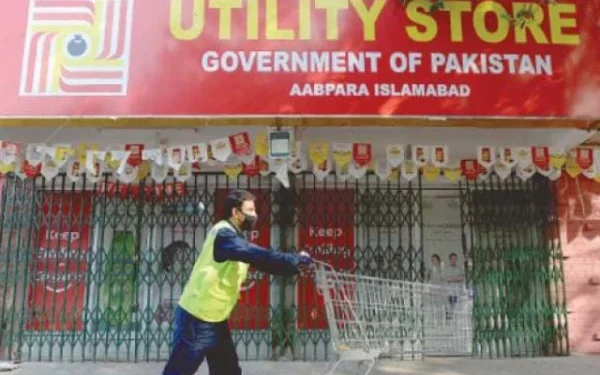Islamabad: The Economic Coordination Committee (ECC) of the Cabinet has officially approved a comprehensive financial package worth Rs30.216 billion for the employees of the Utility Stores Corporation (USC), paving the way for the orderly closure of the state-run institution.
The decision, while aimed at reducing financial losses to the national exchequer, also marks the end of an era for the organization that for decades served as a lifeline for millions of low-income households across Pakistan by providing subsidized food items.
Details of the Rs30.216 Billion Package
According to the notification, the financial package has been carefully structured to cover both employee compensation and outstanding dues:
- Rs25 billion allocated for a golden handshake – This amount will be provided as compensation to the thousands of permanent employees who will be dismissed as part of the closure plan. The golden handshake is intended to minimize the socio-economic impact of sudden unemployment by providing a lump-sum amount.
- Rs5 billion allocated for dues, salaries, and retained employees – The remaining amount will cover outstanding salaries, gratuities, and other benefits. Additionally, around 832 employees retained temporarily will also receive their dues and will be dismissed within the next one year.
The ECC also approved a technical supplementary grant to fund the closure process and directed the Ministry of Industries and Production to further reduce financial requirements wherever possible.
ECC Meeting and Key Decisions
The ECC meeting, chaired by Federal Finance Minister Muhammad Aurangzeb, was attended by ministers for food, commerce, energy, the special assistant for industries and production, and senior government officials.
During the meeting, the following decisions were finalized:
- Payment of Employees’ Dues Ensured – The ECC emphasized that no employee should be left unpaid. All dues, including gratuity, benefits, and pending payments, will be cleared in a transparent manner.
- Sale of Assets and Properties – It was decided that USC’s assets and properties will be sold during the current financial year. The proceeds will be utilized to cover closure-related expenses.
- Transparent Closure Process – Finance Minister Muhammad Aurangzeb highlighted the importance of completing the closure process in a transparent and orderly fashion, ensuring both financial discipline and employee welfare.
End of an Era: Utility Stores Corporation (1971–2024)
The decision effectively brings the curtain down on a half-century-old institution that has played a significant role in Pakistan’s socio-economic framework since its establishment.
- Founded in 1971 during General Yahya Khan’s rule, USC was designed to provide essential commodities such as flour, sugar, ghee, pulses, and rice to the general public at subsidized rates.
- The corporation operated through a vast network of over 5,600 outlets across the country, ensuring even rural and remote populations had access to affordable food.
- In addition to supporting low-income households, the corporation helped stabilize market prices, particularly during inflationary periods and times of crisis.
Expansion Under Musharraf
The ECC was briefed on the history of USC’s expansion, particularly during the tenure of former President Pervez Musharraf:
- The number of stores expanded dramatically from 1,023 outlets in 2001 to 5,557 outlets by the mid-2000s.
- The staff strength also increased from 3,892 to 12,749 employees, reflecting the government’s intention at that time to use USC as a social safety net and a stabilizing force against food inflation.
However, while the expansion initially served its purpose, it also laid the foundation for future inefficiencies due to rapid hiring without accountability or proper financial planning.
Decline and Mismanagement
Despite its noble purpose, USC gradually fell victim to mismanagement, inefficiencies, and corruption.
- Successive governments allegedly appointed incompetent individuals on political grounds, leading to weak management practices.
- Subsidy mechanisms were poorly managed, with leakages and irregularities becoming common.
- Over time, the corporation’s ability to provide meaningful relief to the public diminished, while its operational costs soared.
By the late 2010s, the USC was incurring annual losses of around Rs2 billion, making it unsustainable for the national exchequer.
Government’s Justification for Closure
The Finance Ministry presented its rationale for closure during the ECC meeting:
- Burden on the National Exchequer – The USC had become a financial liability, consuming billions annually in subsidies and operational expenses.
- Golden Handshake to Ease Transition – Instead of abrupt dismissal, employees will be compensated to ease their transition into new livelihoods.
- Avoiding Future Losses – By closing USC, the government expects to save over Rs2 billion annually, money that could be redirected towards more efficient social protection programs such as Ehsaas or Benazir Income Support Programme (BISP).
- Property Valuation Issues – The ECC was informed that USC owned or operated 21 properties valued between Rs10.5 to Rs12.6 billion, but many were not directly owned by USC, creating legal complications for their sale.
Broader Economic Context
The closure comes at a time when Pakistan is struggling with:
- High budget deficits due to heavy debt servicing.
- Inflationary pressures, particularly food inflation, affecting millions of households.
- Pressure from international lenders like the International Monetary Fund (IMF) to cut subsidies and reduce fiscal imbalances.
In this context, the government’s decision is seen as part of broader austerity measures aimed at ensuring fiscal discipline while simultaneously restructuring public sector enterprises.
Impact on Employees
The closure will directly affect thousands of families dependent on USC salaries. While the golden handshake offers immediate relief, many employees, particularly those nearing retirement age, may struggle to find alternative employment.
To mitigate this, civil society organizations have urged the government to:
- Provide skills development programs for dismissed employees.
- Offer micro-financing and entrepreneurship opportunities to help former employees start small businesses.
- Ensure that pensioners and widows connected with USC are not left without financial support.
Public Reaction
The closure has generated mixed reactions across Pakistan:
- Supporters argue that USC had long outlived its purpose and was a drain on the economy. They suggest that direct cash transfers to the poor through digital platforms are more efficient than subsidizing goods through state-run stores.
- Critics, however, warn that the removal of USC could further expose low-income groups to food insecurity, especially amid rising inflation and global supply chain disruptions. They argue that while mismanagement was a problem, the solution should have been restructuring rather than outright closure.
Lessons from the USC Experience
The Utility Stores Corporation provides key lessons for policymakers:
- Accountability Matters – Public sector organizations must be shielded from political interference to avoid inefficiencies.
- Modernization is Key – Instead of relying on decades-old models, governments must adopt digital subsidy systems linked to CNICs and mobile wallets.
- Social Safety Nets Need Reforms – Rather than blanket subsidies, targeted programs focusing on the poorest segments yield better results.
Conclusion
The approval of the Rs30.216 billion package for USC employees officially seals the fate of a 53-year-old institution that once served as a backbone of Pakistan’s social protection framework.
While the closure is intended to reduce financial losses and impose fiscal discipline, it also represents the end of an era for millions of Pakistanis who relied on Utility Stores for affordable food.
The challenge now lies in ensuring that the golden handshake benefits employees fairly, and that new and more efficient subsidy models are developed to protect Pakistan’s most vulnerable citizens.

























